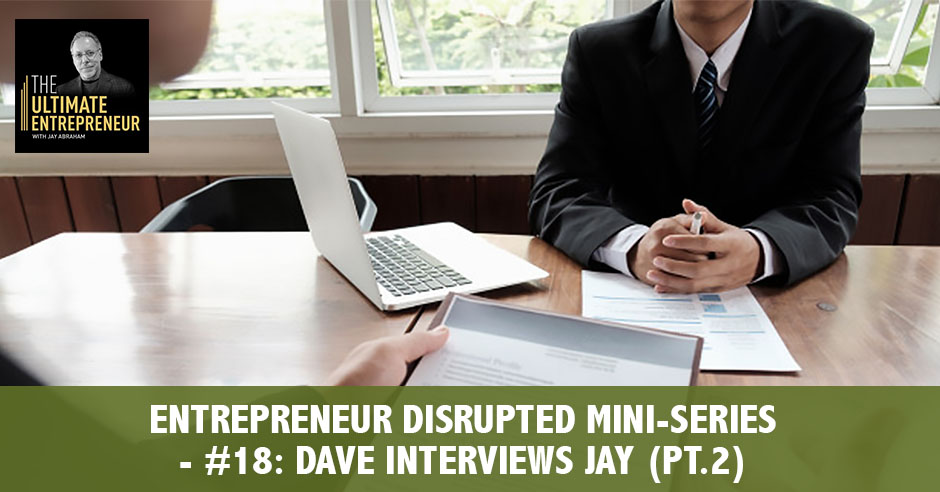Entrepreneur Disrupted Mini-Series – #18: Dave Interviews Jay


Everybody has value, worth and a perspective whether you like them or not. One of the things Jay Abrahams learned early in his life was to very carefully try to examine, evaluate, understand, explore, respect, and appreciate how other people see life because that’s their reality. You can’t change reality until you embrace someone’s value system. Part two of the Jay Abrahams interview with Dave Asprey is a wildly unique bio hacking perspective of Jay. They cover the power of people and smiles, and finding a happy medium between relevancy and irrelevancy, as well as where and how Jay learned what he knows and does and how you can master it.
—
Welcome back to part two of my interview with Dave Asprey where he interviews with me and does a wildly unique bio hacking perspective of me that hasn’t been done before by anyone. This time we’re covering the power of people and smiles, finding a happy medium between relevancy and irrelevancy. Where and how I’ve learned what I know and do and how you can master it. Dave asked totally different and very precise questions coming from a totally different paradigm.
Listen to the podcast here:
Entrepreneur Disrupted Mini-Series – #18: Dave Interviews Jay
Everybody has value and worth and everyone has a perspective whether you liked them or not. One of the things I learned early in my life was to very carefully try to examine, evaluate, understand, explore, respect, and appreciate how other people see life because that’s their reality. You can’t change the reality until you embrace someone’s value system.
Where did you learn all this stuff? Who taught you to be this way?
I have been blessed all my life since I got married when I was 18 the first time, and most of my earlier career. I have no education, was predicated with crazy entrepreneurs who wouldn’t pay me anything, but they would give me a chance to do anything I wanted for a percentage of whatever I created. I went through a broad array of very diverse and disparate industries and activities. As I got a little older, I was very fascinating to people because I was curious and I would sit in people’s offices for hours just watching them do business as a fly on the wall. I got very lucky. I was either attracted to or attracted to entrepreneurs who had, as their default driver, either the filling of a void that existed in an industry or a niche or the adding of value and dimension to a product or service that was already there.
When we would engage in discussion I always wanted to know, “What’s driving you? How are you doing it? Why are you doing it? What’s different about you?” I asked a lot of questions and I listened very carefully to the answers. I think about them and a lot of times, people have never been asked those questions, so the first time somebody expounds, discusses, or get a response, it’s profound because it’s coming from the depths of their passion level. I was very blessed. I was never afraid to ask very penetrating questions that no one else would think relevant and listen and to the most part, retain. After doing it for years and years and industries and industries, you get this outrageous composite of aggregate understanding, perspective, awareness, and admiration as opposed to contempt for all the different strives and issues or perceived issues people will grapple with.
I remember I went to a Dan Peña‘s 70th birthday party at Guthrie Castle in Scotland. Dan’s been a guest on Bulletproof Radio. He spoke at the third conference that we had. They call him the $50 billion man. Brian Rose from London Real, who’s a friend and a Bulletproof supporter, he and I went together, rented kilts and he connected me to this group. There were some strong business luminaries, people who’ve had their entire career in marketing and this is a stereotypical castle. You go there but as people are giving speeches, four different times your name came up in people’s speeches about them. People were talking about how you’re a business man and people who’ve made a difference. You’ve done this for so long.
I’ve been around doing this a long time and a lot of places. You look back on a career and you’re very fascinated at the impact that you can make if your intention’s right and if you really try to be more than intellectual entertainment.
What’s the best piece of advice you’ve ever received?
If you want to be interesting, be interested that most people don’t know how to listen and hear, that you want to put yourself into environment that’s very uncomfortable, well above your comfort, intellectual, experiential, or earning mode, and force yourself to grow. The growth and development of spirit, body, mind, knowledge, humanity is the key to all richness in life.
Who told you these things?
When I started off, I had nothing going for me, so I had a business card made, which said UC Sales. I would go to all these offices in Indianapolis, and they used to have this little glass window where the reception was in this little hole where they could talk, and you could stick your card through. I’d go, and say, “I’d want to see Mr. Asprey.” They’d say, “Do you have an appointment?” I’d say, “No.” They’d say, “Who are you with?” I’d say, “No one.” They’d look at me bizarre and they’d say, “Do you have a card?” I’d day, “Yes,” and I get this card. It wouldn’t reach through the window and they have to take it back to you and maybe one out of 100 failed to get me an appointment. My spiel then was, “Jay Abraham, young, up and coming Jewish boy from the Midwest trying to get ahead in an ever so competitive world,” while suffering the most acutely inflamed sinus condition of my life and everyone laughed. They would stay for hours telling me about their business and I ask good questions.
It was very interesting because if we couldn’t do business together, I would get educated and go somewhere else in the same industry. I could talk authoritatively. I’ve been genuinely obsessed with learning how businesses operate, their psyche, their drivers, their nuances. My background gave me a lot of that because besides doing 400 of the top experts that didn’t come to me for help with their methodology, I had to learn it in order to elevate it, dimensionalize it or monetize it. I also did the Deming Organization that was the Father of Optimization and Process Improvement. I did Qualpro, that was at one time the largest multi-variable testing organization in the world and I got to look at billions of dollars of variability tests. I did Decision Quest, the largest strategic litigation consulting firm in the world and got to look at all the different issues on venue and juries and how differently with graphics you can depict suffering and pain or minimize it. I got a very interesting and unimaginable education in possibilities.

Jay Abrahams Interview: Humanity is the key to all richness in life.
You have tons of breadth of experiences. Having done business consulting with you, how do you look at Bulletproof and what we’re doing? It’s definitely that the cross-industry knowledge is a set of information that you’ve incorporated that I’ve never come across before.
It’s an attribute. It’s a combination of experiential, empirical, sort of intuitive, a little bit psychic, a lot of the ability to integrate in a matrix in your mind, but it’s not. I can teach you my basics very easily, but the experiential empirical nuance part, not so. That’s one of the reasons why I have to charge a lot and work with people at a very high level. I’ve trained millions of people in my basic methodology and it will elevate. If you want to go really deep, maximize, optimize and kick ass, you have to have all these nuances which are experientially based. There’s a concept called Universal Intelligence. The metaphor is the hundredth monkey. If you’ve done enough different industries worldwide, enough different personality types, extricated people from enough Gordian knots, there’s very little, even if you’ve never been in an industry, that you can’t extrapolate. If you ask questions of somebody deeper, better, more connective, and evident that you already know what’s coming next and no one’s ever done that, it blows their mind.
That would be because it’s a different reality, and that’s from my experience. What about someone who’s listening? You’re saying, “Dave, you’re some entrepreneur guy and you’re talking about this top business consultant is completely inaccessible to me.” Where does someone just getting going in their career get access to or to understand what’s going on in the kind of world that you live in?
I started very basic and we started by trying to teach a fundamental belief system and a methodology. Over the years, I’ve gotten to the point where I’m older and I’m more legacy oriented. I still like companies that have enough assets in play that I can really leverage, but we want to be the greatest benefactors to entrepreneurs. We have a site, it’s Abraham.com. On that site is a sub-site called 50 Shades of Jay. It’s got a thousand hours and probably 20,000 pages. Not only does it not sell anything, but it doesn’t even ask for an opt-in. Our perspective is if we know a lot of people will never be able to afford us and maybe won’t want to but we can afford to invest in every entrepreneur that wants to be preeminent, that wants to be a true value creator, that wants to multiply the performance and the quality of their team, that wants to add more connectivity, so we give away or actually buy.
We give people, at my expense, programs that are better than what most people sell for thousands of dollars. They don’t sell anything. Anybody can go to Abraham.com/50Shades and you can have a field day because there’s ideological philosophical stuff, there is very granular stuff, there are interviews with people like Tony and you. There’s one set where I thought everyone should be more childlike so we sent out 25 YouTube video musicals from Disney movies. I said, “You can’t be great if you don’t let yourself be vulnerable. You can’t be vulnerable if you don’t let some of your childlike innocence free.”Worldview is something most people don’t allow themselves to constantly enrich, expand, and nourish.
I know a lot of people who sell information online for thousands of dollars but I don’t do that. That’s not for my business. I, like you, believe it’s better that people have the knowledge. I’d rather give it away and then they’ll purchase something at the right time or they won’t. I was pretty blown away when you’re like, “I found out people were copying my expensive programs,” so I just thought, “I’ll sell my hard drive.” That is everything I’ve ever done on it.
We changed our whole status. We said, “I don’t want to compete with a bunch of interlopers or superficial, self-anointed people that are dangerous to people’s wealth. I’d rather we see ourselves as massive investors in the quality of entrepreneurs and in the future of just capitalism.”We can help people who probably don’t realize how much more is possible for themselves, and we try to do it. I still love high-paying, seven figure clients and I love deals I can get involved in, but most of the time, most people we invest in without any reciprocal expect. It comes back.
If someone came to you tomorrow and they said, “Jay, based on all this stuff you know, all this stuff you’ve lived, I wouldn’t be better at everything I do. What are the three most important things that I need to know?” What would you tell them as your most important advice?
Passion, purpose, possibility.
What does each of those things mean?
You got to be passionate about not just what you do, but who you do it for. You got to fall in love. If you don’t like what you do, who you do it for, it can be who you do it for is your employer or your marketplace, you shouldn’t be doing it. I have a very good, dear friend of mine who wrote a thesis and said, “You’re either a multiplier or a diminisher whether you’re an entrepreneur or business leader, a manager or an employee. You’re either making people greater, you’re adding value societally, you’re improving performance, humanity, or you’re taking or you’re sucking oxygen out of the environment philosophically and metaphorically.” You got to be on a crusade or a mission and see your role.
We’ve done this with your people. You got to see that no matter what you do in a business, you have to be the leader to have relevancy and have a connectivity that you make a difference in the fulfillment of a meaningful product, service. One of the things most people are scared to go into is another field, which is tragic. You have to have passion. You have to have purpose. When you are fortunate as I’ve been to see how much more is possible from everything, time, effort, connectivity, capital, interaction, relationships, resources, you’ve got a question and believe that you have not come close to capitalizing, optimizing all elements of your business life, your career and your personal life. If you get those three in alignment, you’re pretty fortunate.
It’s a challenge to get those in alignment but I like that advice.
Can I ask you a question? Did I give you the kind of interview you want or was it all over the place and diffused?
You answered all the questions, Jay. You’re always someone who’s willing to share what you think about and go where your mind takes you, which is why sometimes, I feel like you’re downloading stuff when you’re talking. It’s coming together right as you’re saying it, which is really cool. It’s very authentic. I would say you answered all the questions and you were clear. You weren’t all over the place.

Jay Abrahams Interview: Every human being influences some people.
I hope I added value. I learned this from Fran Tarkenton, who’s a friend of mine. He’s the NFL Hall of Fame quarterback who lost two times in Super Bowl in front of 50 million people, which is a lot worse than losing face in front of one person. I had a business reversal that was quite profound and he came back with a renewed attitude. He said, “Every time you interact with any person, for any reason, for any amount of time, your job, your goal, your moral responsibility, your opportunity, your privilege is to make that person better off because you were in their life.” It’s wonderful. I’m not trying to be positive thinking. I have learned that there are a lot of integrative forces, factors and elements one has to integrate to get the maximum out of a life, a business or a career.
There’s a time in my life when I was more of an engineer, I would have rolled my eyes and be like, “Really?” That’s not how it works but my life experiences, that’s how it is. I was young, arrogant and angry, and I am none of those things anymore. Thanks for being on Bulletproof Radio, and thanks for all your advice and your friendship as well.
Thank you for allowing me to take up opportunity cost to your audience. I’m privileged.
I’m sure that you delivered value.
When it’s all done, did you make a difference? You’re very fortunate. You’re influencing millions of people but every human being influences some people. Did you make a difference? Did you add value? Did you make lives better off because you were in them? That’s the real question.
That’s what keeps me satisfied and happy is just knowing that I’m making a difference. If this sounds cliché to you, it’s because whatever you’re doing isn’t making a difference. If it was, you know what I was talking about.
I have had numerous, very open discussions with you about a lot of issues and I can tell the audience that your motives are their best interest. Your commitment is their elevated performance and richness of life, and that your fanatic for them, not for yourself. You’re very humble, very down to earth, very gracious, and very authentic. It’s important that people know that.
Thanks, Jay. You can head on over to Jay’s website, Abraham.com/50Shades and there is no affiliate tracking codes or any of that. That’s the link for all this free stuff.
It’s got a lot of valuable contribution without any expectation.
Important Links:

